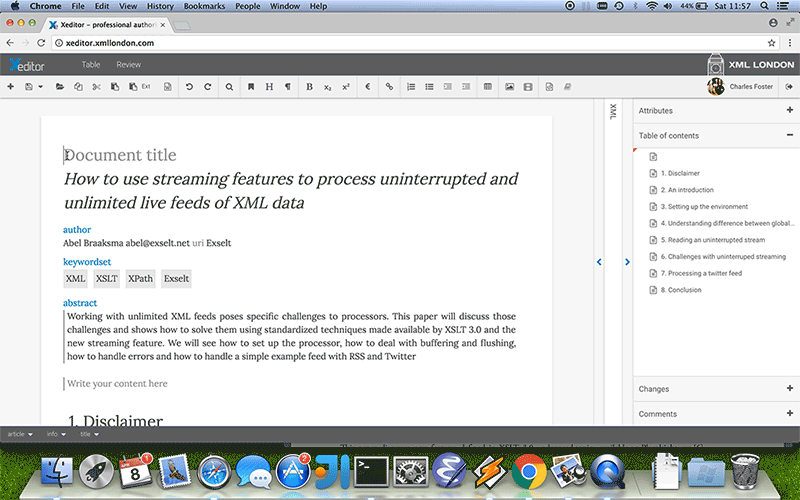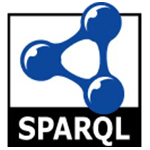Opening of Call for papers.
Call for Papers
XML London 2017 Conference
Call for Papers is now closed
We are interested in hearing from first time speakers as well as "success stories" of projects where XML or Linked Data technology have been beneficial.
As an XML conference, all papers which are focused around XML and Linked Data technologies such
as XSLT, XQuery, SPARQL, XForms, XProc etc are welcome, but papers which target
a conference theme topic will usually be given more consideration
than papers which do not.
However, papers of outstanding quality or novelty will always have
a place at XML London, regardless of whether they fit into any of the
conference theme topics.
15th February
21st March
Close of call for papers.
6th April
Notification to Authors.
5th May
Receipt of Final Papers.

DocBook XML Format
Final papers must be submitted as well-formed and valid DocBook 5.0 XML documents.
The XML documents root level element must be an <article> node.
DocBook documentation and schemas can be found on the
DocBook website.
Final papers must be submitted as well-formed and valid DocBook 5.0 XML documents.
The XML documents root level element must be an <article> node.
DocBook documentation and schemas can be found on the
DocBook website.
We strongly recommend that authors complete their final papers in the online web-based editor provided at xeditor.xmllondon.com which has a similar interface to MSWord yet writes beautifully structured DocBook XML behind the scenes.
Your DocBook XML paper and images can be saved to your Google Drive account.
When you have completed the paper and are ready to submit it to the CMT,
there is a button to download the entire paper, including images as a
docbook.zip package.
Instructions for Authors
XML London started accepting papers and extended abstracts on 15th February 2017. Initial submissions were posted for review by 21st March. Now final papers must be completed by 5th May in DocBook 5.0 XML format.
Submitting a final paper
XML London use Microsoft's Conference Management Tool to handle submissions.
To submit an extended abstract or a final paper, please use the following URL:
https://cmt3.research.microsoft.com/XMLLondon2017
What is an Extended Abstract?
An extended abstract is some what shorter than a full paper, being between 1 to 4 pages long. The document should include an abstract, references and enough clear, detailed information and explanations so the program committee members can easily get a clear understanding of what you are proposing.
Conference Theme Topics
Modern Publishing
Single sourcing. Delivering content to a Web of Devices using Markup technologies such as DITA, S1000D, BITS, DocBook, EPUB, etc.
Applied & Business Stories
Real life use cases of where XML technologies have been beneficial and what challenges were faced.
Financial Data
The role and use of XML technologies in the world of banks, finance & trading, regulatory reporting. FpML, FIBO, FIX, etc.
Open Data
The world of Information Exchange and Data Management, RDF and Linked Data, CSV, Semantics and SPARQL.
XML Elephant
Coping with and processing huge volumes of XML and Big data effectively.
Teaching XML
XML technology is cool, why so? What can it do for people who are not using it?
Document & Graph Databases
The future of search over structured and unstructured data with NoSQL solutions.
HTML5
HTML5, Web Components, cutting edge web standards and innovations.

